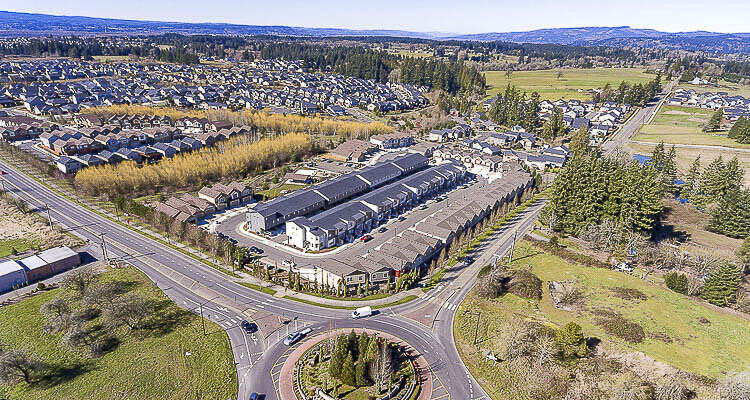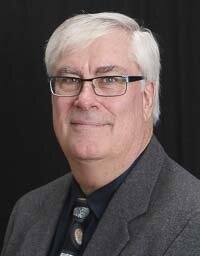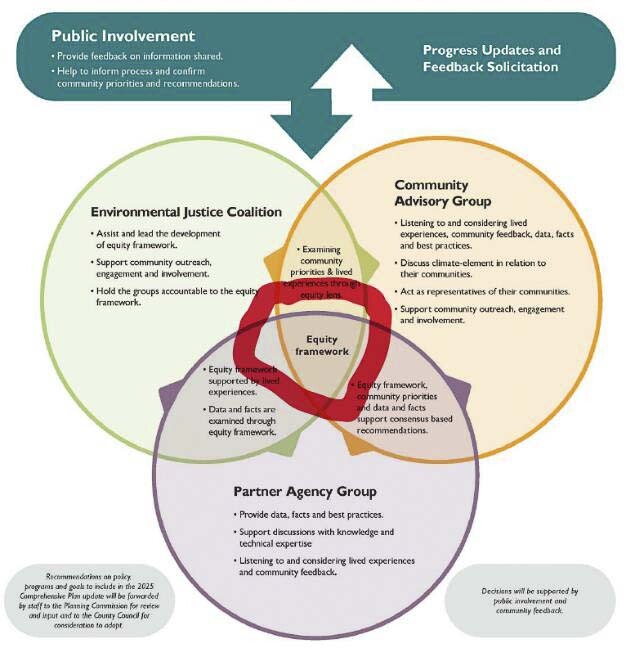
Former Councilor Dick Rylander offers his insight on the County Council’s draft plan for the Clark County Climate Stakeholder Assessment Summary and Recommendations.
Dick Rylander
for Clark County Today
The Clark County Council is set to review (and potentially approve) the draft plan for the Clark County Climate Stakeholder Assessment Summary and Recommendations Report on Tue., Nov. 28.

The documents are voluminous and complex. Basically the Washington State Legislature and Gov. Jay Inslee approved new laws regarding reduction of impact on climate change. The draft of the county’s report can be found here. It is 83 pages in length. There are two additional documents prepared by staff.
The “plan” was created by a Portland consultant. It was completed in just two months. The focus of the process is on “equity,” not equality regarding actions and impacts. They propose that there be three groups comprised of members of the public and special interest groups. To become a member of one of the advisory groups an application would be filled out and submitted and reviewed by a “neutral” third party.
To be considered for membership in the working groups, applicants would be “using data and facts to lead the process and discussions, especially using data to establish the same foundational understanding of equity and climate change for everyone.” Under those guidelines it appears only those who believe climate change is real and believe in an “equity” approach would be appropriate to include while those who don’t necessarily agree with those tenants could be excluded.
If the three working groups can’t come to “consensus” they suggest using “rank choice voting” (which was soundly turned down when it came before the voters). Why would they recommend something the people don’t support?
Beware of the Environmental Justice Coalition advisory group. Their “powers” are currently vague but the name implies something that should concern citizens. Here’s the graphic from the consultants report:

As you can see the overlapping goal is ”equity.”
Regarding the costs of the massive restructuring of our society they say:
Cost topic
- For small businesses, home builders and developers meeting climate policy requirements will be expensive.
- More specifically, the cost of building affordable housing will rise: state and local agencies should have incentives available.
For residents
- Increased cost of living will be a likely unintended consequence of climate change policy.
For unspecified persons or organizations
- Electrification is costly. There needs to be a dual system; electrification can’t handle everything.
Their solution and view? The long-term benefits will justify the pain. Apply for grants or other funds (they don’t say where) to try and offset the costs.
Trust, equity and inclusion
Equity and inclusion will need to be front and center and be considered in every aspect — not just related to people, but industry and technology as well.
Gasses and other forms of pollutants must decline. Vehicle Miles Traveled (VMT) must be reduced. The county/state projections are that Clark County, by 2045, will have (middle range estimate) 698,000+ residents (a 36.9% increase). How do you reduce miles traveled with a 1/3rd population increase? They don’t explain. However, the only way would be to concentrate people in high density locations, reduce vehicle ownership, increase use of public transportation and restrict rural development.
How do they suggest the climate goals be met?
Specific measures
- Add native plants on county land to sequester more carbon and add habitat. Native plants are more tolerant of hotter and drier conditions and would require little or no pesticide.
- Distribute compost bins for food waste, to reduce landfills’ contribution to greenhouse gas emissions.
- Require solar-ready roofs for new construction projects.
- Require new parking lots to be Electric Vehicle ready.
- Start installing solar on buildings, carports, and brownfields.
- Replace old natural gas systems with electric heat pumps.
- Gradually replace the county fleet with electric vehicles.
- Encourage development plans that allow people to have different transportation options, including being able to walk or ride their bikes to destinations.
- Speed up permitting for solar by using SolarAPP, a platform developed by The National Renewable Energy Lab.
- Partner with Clark Public Utilities to install solar on large Clark County buildings.
The plan for all of these changes must be in place by June of 2025 and be used in the growth management planning process.
This is too much too fast with little or no data nor specific goals. Vague terms like ‘reduce’ with no measures for comparison or targets. The changes contemplated are so significant it would restructure society as we know it.
Please take the time to review the materials and weigh in. Quite literally your future and the futures of your children and grandchildren are at stake. Ask the members of the County Council to push back for more time and research before committing to life changing plans.
Here is a link to the County website. Look to the right hand side of the page for links to multiple documents as well as details about the meeting: https://clark.wa.gov/community-planning/2025-update-meeting-and-event-information
Dick Rylander is a former Clark County councilor and long-time resident of Clark County.
Also read:
- Opinion: OIC tells consumers not to pay for ‘insurance’ you won’t likely benefit from: Does that include WA Cares?Elizabeth New (Hovde) of the Washington Policy Center believes you should consider yourself warned by the Office of the Insurance Commissioner about WA Cares and its maybe-only benefit.
- Opinion: Same road, different speed limit?Target Zero Manager Doug Dahl addresses a question about speed limit signs going into and leaving town.
- Opinion: Hiding the growing cost of the Interstate Bridge replacementJoe Cortright of the City Observatory addresses the rising cost of the Interstate 5 Bridge replacement project.
- Letter: ‘This election I am NOT voting for Greg Cheney’Clark County resident Wynn Grcich shares her thoughts on Rep. Greg Cheney and the issue of fluoridation in area drinking water.
- POLL: Should biological males who identify as females be allowed to compete in athletic events against biological females?Should biological males who identify as females be allowed to compete in athletic events against biological females?










